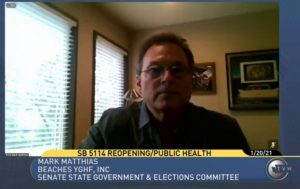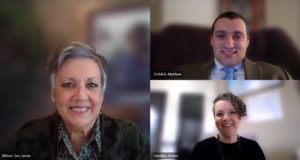It was quiet at the Capitol this week, including on Inauguration Day. That was the same day as the Senate committee hearing on Senate Bill 5114, the bipartisan “safely reopen Washington” bill I’m co-sponsoring. The calm was not necessarily a good thing, however, and here’s why.

Clark County was represented well at the public hearing this week on the bill I’m co-sponsoring to let restaurants, gyms and other businesses immediately reopen to 25% capacity.
One day in 2019, hundreds of hairstylists and salon owners and barbers swarmed the parking lots and grounds around what is basically the Senate office building. They had come from far and wide, closing their shops if necessary, to protest against a Senate bill that threatened their ability to work as independent contractors. When it was time for the committee hearing that day, the opponents packed the room – peacefully but very visibly. I’m convinced their physical presence persuaded the chair of the Senate Labor and Commerce Committee to quietly “kill” the bill.
In contrast, more than 1,500 people signed in by Wednesday in support of the reopen-Washington bill. That’s far more than the number we saw during what some called the “hairstylist uprising.” Also, 90% of the 40 people who were called to testify spoke in favor of the bill. But I have to wonder whether it has the same effect on the committee members, or the committee chair.
To put it another way: If the committee chair is unable to look out into a hearing room filled with people or look out the window to a parking lot filled with protesters, do the numbers of comments or Zoom windows on a screen convey the same depth of public concern? Does going “virtual” have anywhere near the same effect? If not, how can the majority say it’s not infringing on the people’s access to democracy?
I’m also concerned about how those testifying on SB 5114 had maybe a minute to speak (in past years it’s usually two minutes, even if the hearing is crowded) and how committee members have little opportunity to ask questions. I’m hopeful things will improve, but at the moment my suspicion that going “virtual” would mean less access to democracy is being confirmed.
Bill about limiting emergency orders deserves a public hearing…now!
When the Tiffany Hill Act was hung up in the House of Representatives last year, needing a committee vote to remain viable, outside pressure helped save the day. I could use the same kind of help now with my bill to rein in the governor’s emergency powers.
My SB 5039 would allow the Legislature to review ALL – not just some – of the proclamations made during a state of emergency. Unfortunately it’s hung up in the Senate State Government & Elections Committee. The committee chair has NOT responded to my request for a public hearing, even though this very straightforward, reasonable, bipartisan bill is co-sponsored by more than 1/3 of the Senate. Time is running out to get it moving before the “cutoff” on committee action next month.
How can you help? Click on this link to email Senator Sam Hunt and ask him to schedule a hearing (and a vote!) on SB 5039 as soon as possible. If your family, friends, colleagues, and coworkers can also send emails, all the better!
An 18-cent gas-tax hike?
This week we learned the House majority party wants a big new transportation package – a whopping $26 billion proposal. It would include an 18-cent hike in a state gas tax that’s already among the highest in the nation, as well as a:
- “carbon fee”;
- “diesel tax differential”;
- $10 hike in truck license fees and passenger vehicle weight fees; and a
- 50% increase in the cost of license plates for cars and motorcycles.
There are many more – click here to see the whole list of “additional revenues” being pursued.
I didn’t support the previous package of new transportation projects – the “Connecting Washington” package of 2015 – even though I appreciated how it reflected a great deal of public input from all corners of the state. It’s not clear to me that the House Democrats behind this new proposal went to the same effort. Did they go into districts served by Republican legislators, to learn about their transportation needs?
We do need to look at funding for maintenance and preservation, and the fish-passage issue handed to us by the U.S. Supreme Court, and the Interstate 5 bridge, but the gas tax is among the most regressive taxes in our state. I don’t know how my colleagues across the aisle can complain about how Washington’s tax system is so regressive then introduce a proposal that would make it even more regressive. Let’s also remember that families and employers are still trying to get through a pandemic, and the last thing they need is more financial pressure from tax increases of any kind.
Increase in unemployment rate is another reason for caution
My new position of budget leader for the Senate Republican Caucus comes with some other duties, like serving on the state Economic and Revenue Forecast Council. The council releases a state revenue collection report each month, and its December report showed a loss of 19,000 leisure and hospitality jobs in November and December. I don’t think it’s any coincidence that the job losses happened in step with the governor’s latest lockdown, which began in mid-November and is still in place.
The job losses (which included a net loss of 5,900 private-sector jobs over those two months) no doubt contributed to the first increase in the state’s unemployment rate since July: November’s rate was 6.7%, but in December it jumped to 7.1%. There’s another reason to avoid new taxes and let the economy have a chance to recover.
I was also dismayed to learn that our state ended 2020 with 215,000 fewer jobs than at the end of 2019, and more than 10 percent of that loss was in manufacturing. It reminds me of how the governor vetoed a bipartisan 2017 bill that would have encouraged growth in Washington’s manufacturing sector, and how that caused problems this past year for the state’s largest aerospace company (Boeing). We sure could use more manufacturing jobs and aerospace jobs as our state emerges from the pandemic! We are the most trade dependent state in the nation. We need products to export. Manufacturing is a big part of that.
Meet Team Wilson!
Before we get too far into the 2021 session, let me introduce my staff. Many of you will remember Amber Hardtke, my longtime Legislative Assistant. I’m pleased to welcome as my Session Aide a native of the 17th District, Matthew Frohlich. I’m grateful to have such an accomplished and proficient staff!
I’m only able to work with Amber and Matthew virtually this session, which has been quite an adjustment, but we are figuring it out and taking care of business!
I’m sorry I can’t invite you to come and visit me at the Capitol, but if you have a question or concern, please contact me by email, letter or phone. To make an appointment for a virtual meeting, please sent me an e-mail! Stay safe!
— Lynda
#freedomiseverything










